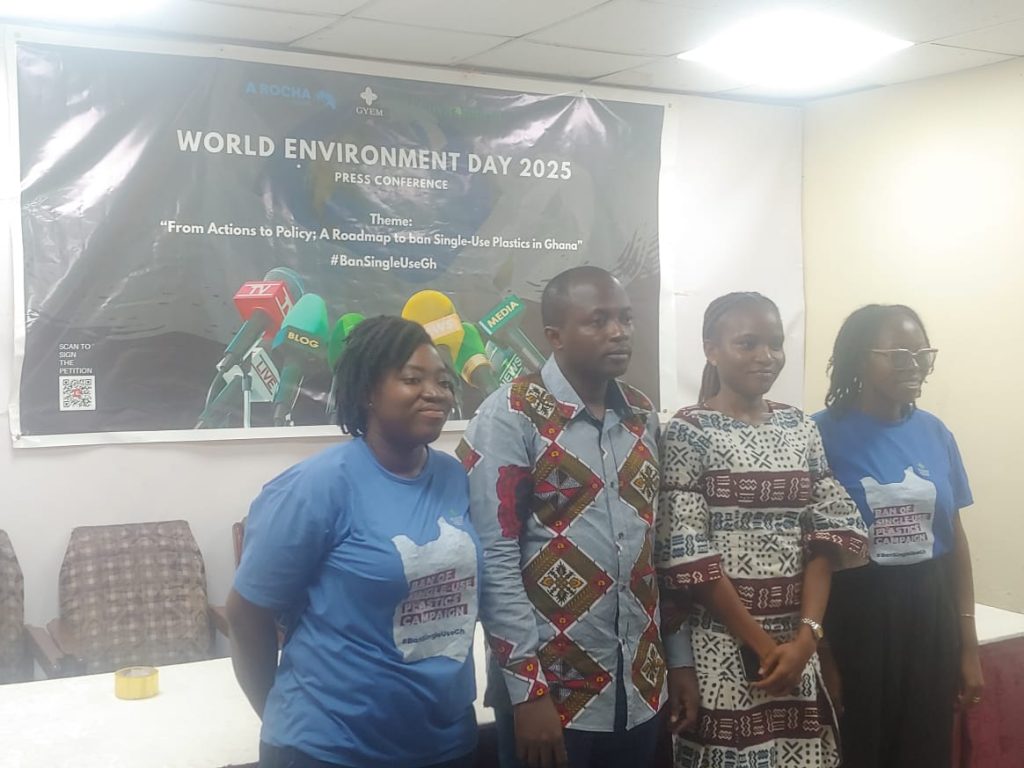In a powerful World Environment Day statement, the Ghana Youth Environmental Movement (GYEM) has renewed its call for urgent national action to ban single-use plastics in Ghana, unveiling a bold roadmap to phase out harmful plastics by 2027. Under the global theme “Ending Global Plastic Pollution”, GYEM’s National Coordinator, Glory Emmanuellia Appiah, outlined a five-point plan during a press briefing in Accra, urging policymakers, civil society, and the public to unite in tackling the escalating plastic crisis.
“Plastics have invaded our oceans, choked our rivers, polluted our air, and endangered our health,” Appiah stated. “This is not just an environmental issue; it is a public health and economic challenge that demands urgent national action.”
A Crisis Demanding Bold Action
Ghana produces an estimated 1.7 million tonnes of plastic waste annually, with the vast majority ending up in drains, water bodies, and open spaces. GYEM cited the devastating floods in Accra during the recent rainy season as a clear consequence of clogged drains due to plastic waste. Other impacts include the death of marine life from microplastics, increasing respiratory diseases from burning plastics, and declining fish catches due to plastic-filled seas.
Over the past four years, GYEM has led grassroots mobilisation efforts through clean-ups, sensitisation campaigns, and plastic-free advocacy. With over 4,000 people directly engaged in markets and transport hubs like Kaneshie and Accra-Tema Station, the movement has trained hundreds of youth as anti-plastic ambassadors and produced educational documentaries to shift public perception.
The Roadmap: A Five-Point Strategy
GYEM’s proposed roadmap to a single-use plastic-free Ghana by 2027 includes:
- Phased Ban: Beginning with plastic bags, straws, styrofoam containers, food wrappers, plastic cutlery, and beverage bottles.
- Business Incentives: Supporting companies that produce sustainable alternatives to scale operations.
- Capacity Building: Strengthening the ability of local authorities to enforce bans and improve waste segregation.
- Youth Inclusion: Ensuring young people and communities are involved in policy and decision-making.
- Public Accountability: Introducing mechanisms to track government and corporate commitments.
A Call for Collaboration and Urgency
GYEM commended the Environmental Protection Agency (EPA) for recent efforts to ban plastics in certain areas and urged swift legislative action to extend this nationwide. They emphasized their readiness to support implementation through continued grassroots mobilisation.
The organisation also called on the Ministry of Environment, Science, Technology, and Innovation (MESTI), EPA, and Parliament to treat plastic pollution as a national emergency and pass comprehensive laws to end the single-use plastics menace.
Furthermore, GYEM appealed to the media to amplify awareness efforts and celebrate local innovations in recycling and the circular economy. They also proposed the formation of a Civil Society Coalition on Plastic Pollution, aiming to unify advocacy and maximise impact across environmental initiatives.
“We must build a unified voice to ensure plastic pollution remains high on Ghana’s development agenda,” Appiah concluded.
As World Environment Day 2025 reminds the world of its shared environmental responsibilities, GYEM’s message is clear: The time for action is now, and the youth are ready to lead.

